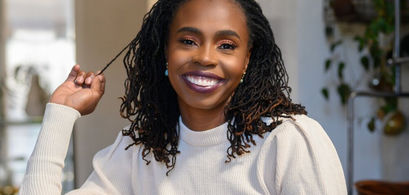Self-made personal finance coach Naseema McElroy successfully paid off $1 million in debt, growing a six figure net worth, in just 3 years. In addition to her personal finance platform, Financially Intentional, Naseema is the published author of Smart Money: The Step-by-Step Personal Finance Plan to Crush Debt. Based in Northern California, in the United States, Naseema focuses on helping her “debt-slaya community” take control of their finances, eliminate debt and break the cycle of living life paycheck to paycheck. In this interview with MoneyTransfers.com Naseema shares invaluable insight and the key lessons she has learnt on her journey to unlocking total financial freedom.

Would you please introduce yourself to any of our readers who may not be familiar with your work?
My name is Naseema, I’m a labour and delivery nurse, mom of two girls and a personal finance enthusiast. My interest in personal finance came about when my oldest daughter was turning one; I started on a journey to educate myself and take control of my money. I had been taught to go to school, get the degree, get the job, work the job, but I was never taught about managing finances. I found myself in a place where I was making very good money registered nurses in California earn more than in any other state) but I still had no savings because I had a lot of debt. So I went on a mission to pay off all of my debt, setting specific intentions and sharing them through my platform Financially Intentional, in the hopes of potentially helping others along the way. By doing this I totally shifted my perspective on not only money, but life in general; it’s been a great journey.
A Guide to Moving to and Living in the USA as an Expat
Is the level of debt you found yourself in common in the United States?
Yes, it was all pretty standard debt. I realise $1 million dollars of debt sounds like a lot but anyone who knows about the cost of living in Northern California, knows it is one of the most expensive places on the planet. My debt consisted of housing costs, student debt for two degrees, divorce proceedings and other day-to-day expenses such as medical bills, paying for braces, childcare etc. None of these costs are abnormal. I initially didn’t even consider my student loans to be debt because growing up, everybody told me it was normal to have student debt.
Could you talk us through how you wrote off $1 million dollars of debt?
I started by selling my rental property, once I sold that I freed up money to put towards everything I considered debt. Then I started following the work of Dave Ramsey (a popular personal finance personality in the States) who spoke at length about putting “every dollar you earn towards your debts.” I started to follow two key methods, both of which drastically changed the way I viewed money.
First I started Zero Based Budgeting (ZBB) which requires you to give every single dollar you earn, an assignment, in advance. This is a very intentional way of looking at every single dollar you earn and seeing how each one is spent. Once I started practicing this method I began to notice I had previously not known where my money was going; in fact, most people can’t tell you what their money is being spent on, because most people don’t look. Taking a closer look helped me prioritise paying off my debts.
The second method I used, to take control of my finances, was The Debt Snowball. This is one of Dave Ramsey’s best known debt repayment plans and it requires you to list all your debts from smallest to biggest, attacking the smallest debt and making minimum payments to the rest, until the small debt has been eradicated. Then you repeat the process. By doing this I began to realise how much power I had over my money, and I began thinking “wow, taking control of your money isn’t just about the dollar figure, it’s about buying back your life.”
Every extra dollar you can save or use towards paying off debt or investing in something, will give you hours of freedom later on. After that, life becomes about what you want to do rather than what you need to do because you’re struggling financially.
Naseema McElroy on becoming financially intentional
How did you allocate a purpose to every single dollar as per the Zero Based Budgeting rules?
You start by allocating every single one of your dollars to things you spend money on, including saving and investing. Look at your topline expenses: housing and transportation are typically the highest spend categories. If you can really drill those expenses down, you can permit yourself spontaneously spending here or there. But you must also establish your one, overriding goal. Do you want to be debt-free? To save for an emergency fund? To build an investment portfolio? Once you have a specific goal in mind, you will be able to allocate your dollars intentionally.
I set up a budget using an app called You Need a Budget (YNAB) which offers Zero Based Budgeting tools. If you want to use this method you must enter every single dollar you earn into the app and you will clearly see how much money you need to budget for the rest of the month, as well as how much money will carry over to the next month. This gives you total control over your money.
Understanding what you are actually using your money for will serve as a guide for how to live your life intentionally. Create a plan and stick to it. This stuff is not necessarily intuitive, you must allow yourself a grace period of at least 3 months to get used to this new budgeting system, but once you get there, the way you look at money and how you spend it is totally shifted.
People hear me lay out these guidelines and their mind goes to deprivation. “I won’t be able to spend money on anything”: but that’s not true, it actually opened up the world to me. This budgeting system allows me to free up money so I can do the things I want for me and my family.
What would be your advice to get out of debt for anyone who does not own a property?
I would never recommend blindly following one single person’s advice: it’s called personal finance for a reason, so you have to take what works for you and leave the rest.
Regardless of whether you own property or not, you must learn to make your money serve you. I make my money work for me; my dollars serve me. Fundamentally, it’s all about increasing the gap between what you earn and what you spend. There are finite ways to spend less, so instead, I encourage people to earn more where possible, because there are infinite ways to earn more money.
However, what most people are doing is working paycheck to paycheck, but once you shift your mindset you will begin to realise your money doesn’t take days off, it doesn’t call in sick. It will continuously accumulate for you, to help you pay down debts so that you’re reducing what you’re spending on interest and fees. Also, it doesn’t hurt to surround yourself with people you aspire to be like.
How To Transfer Money Within the USA
What is your biggest achievement to date?
Writing off all my debt in three years. This makes it sound like I have it all figured out but let me tell you, I did this while juggling being a single mom, working as a nurse and filing for divorce in an abusive marriage. There was a lot to overcome but I’ve achieved a great deal in spite of my circumstances.
When do you plan to retire?
I truly believe that nursing is the cheat code to financial independence, because I don’t think I will feel the need to formally retire. I deliver babies for a living and I love what I do. I would like to get to a place where I work just four shifts a month then take two months off, and still be in a good financial place. I will always go back to my job so I don’t know if I will retire in the traditional sense, instead I’d like to rely on my financial acumen to take a year or two off. The reason financial independence appeals to most people isn’t because they want to stop working, but because they want to make work optional and create a life they want to live, not a life they have to live. A lot of people that are financially independent have turned their retirement into something impactful, without having to worry about the paycheck due to being self funded.
What is your main goal for the future?
My main goal for the future is to give my children the experiences I never got growing up. I really think that if you haven’t experienced everything the world has to offer then your perspective will be very limited. I want to give them the opportunity to be exposed to as many cultures as possible and bring that education back home. I am also working on a bank for nurses that is different from traditional banks, to help nurses manage their money, build wealth and reach career goals, so that’s pretty exciting.

Do you have any money saving advice for our expat community who are earning money overseas and sending it home to friends and family, or to pay student debt?
A lot of my advice is universal, whatever your financial goals are. A lot of people have to send money home to help their family, so they have additional financial obligations on top of saving, investing and paying down debt. In these cases I would recommend trying to figure out ways to maximise your income, wherever you live. Whether that’s finding the best deal on insurance, assessing your housing costs, buying a more cost effective vehicle: consider the ways you can finesse your income and maximise every single dollar you earn to help you meet your financial goals. Everything is negotiable.
What is your most important money tip above all else, if you had to choose one?
I believe that, generally speaking, we are not encouraged to invest so we end up thinking it is difficult and inaccessible. Originally I confused “investing” with what was actually “trading” and I think that’s common, but people shouldn’t be put off by investing because it doesn’t have to be hard.
I encourage people to start investing as soon as possible because it is not about timing things perfectly, it’s about the longer you’ve been in the market, the harder your money can work because of the power of compound interest. Regardless of your background, or what you’ve heard about the stock market, investing your money is the only way to grow real wealth: you can’t save your way to wealth.
Naseema McElroy on investing
What sort of ventures do you invest in? Do you have any investing advice for our readers?
I grew up thinking buying property was the way to go, because for black people in America, it felt like the only accessible form of investing. When I came of age I began buying property before losing it all in the housing crisis. I went through two foreclosures, two short sales and ultimately had to file bankruptcy. This really scared me and put me off that kind of investing. Then I read a book called The Simple Path to Wealth by J.L. Collins, a financial consultant who worked for all the major finance companies, helping them grow their money. What he ultimately learnt was sticking to a simple path of investing in Index Funds resulted in huge profits.
Index Funds allow you to purchase the whole stock market, not just one stock that you hope will perform well. These Index Funds are super diverse so you don’t lose all your money if one of the stocks goes south, as it gets replaced by the next best stock. Decide on a figure that you can comfortably allocate each month and let it go; your wealth will steadily grow as a result. Simple apps such as Acorns and Robin Hood will help you get your feet wet and automate things for you.
I also recommend opening an account with a discount brokerage such as TD, Vanguard or Fidelity. They are called discount brokerages because they let you start investing with just $50 – 100, and the apps let you start investing with even less. These are just elementary steps to investing but it is good to get started with these tools.
Outside of this kind of investing, if you have a company retirement or pension plan, you are an investor and have been for as long as you’ve been working. At your job you will have a retirement plan which is money that has been set aside for you. A lot of people don’t know how much money is going in there, so I encourage people to take a look because that’s probably the biggest chunk of money you’ll ever invest in and have control over.
Connect with Naseema McElroy
https://www.financiallyintentional.com/

Top 10 International Removals Companies
Organising a move can be stressful enough, so uprooting to an entirely new country altogether comes with its own unique obstacles. Whether you are moving your family, your business or on your own, there are a lot of things to consider. To make matters easier we have put together a comprehensive list of the Top 10 International Removals Companies, in the hope we can alleviate some of the stress.
Międzynarodowy Dzień Pracy 2022
O Międzynarodowym Dniu Pracowników 1 maja każdego roku wiele państw obchodzi Międzynarodowy Dzień Pracownika. To coroczne święto jest okazją do uczczenia ciężko pracujących specjalistów wszystkich branż, upamiętniając sukcesy międzynarodowych grup praw pracowników, takich jak Federacja Zorganizowanych Zawodów i Związków Zawodowych (FOTLU). W 1884 r. To FOTLU stanął w obronie pracowników na całym świecie, żądając lepszych […]
Día Internacional de los Trabajadores 2022
Acerca del Día Internacional de los Trabajadores Como cada año, el 1 de mayo, las comunidades globales celebran el Día Internacional de los Trabajadores. Este día festivo internacional es una oportunidad para felicitar a los trabajadores y trabajadoras que dedican su tiempo a cada línea profesional, así como a conmemorar el éxito de los grupos […]
Contributors








.svg)









.jpg)

